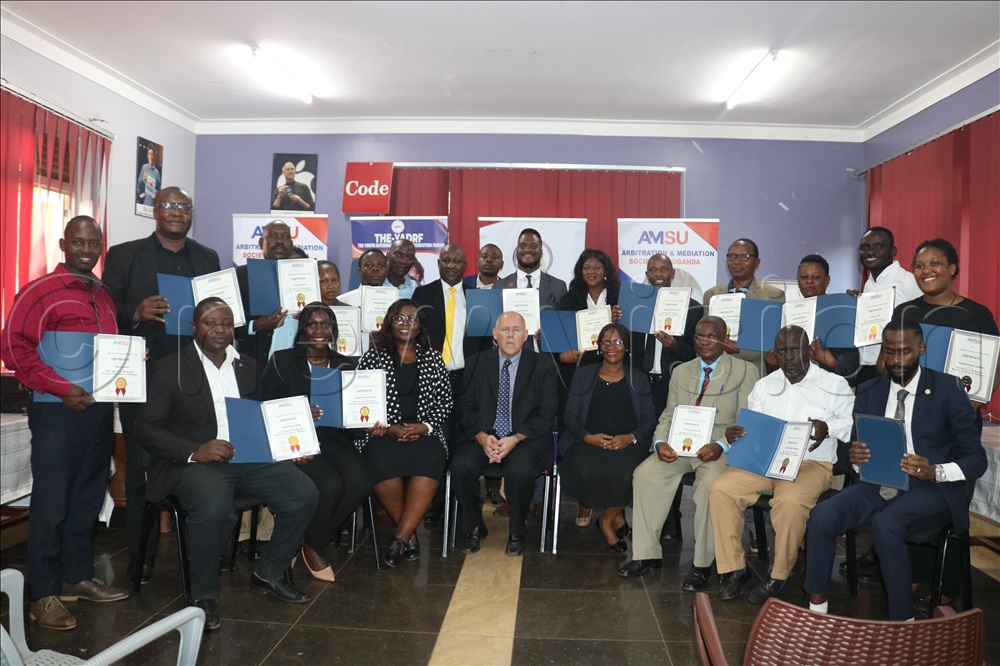Professionals advocate for out-of-court arbitration, meditation cases
AMSU’s mission to promote internationally recognised ADR standards are timely considering that court backlogs are soaring, particularly in commercial and land disputes.
Frances Ddungu (left), the CEO of the Arbitration and Mediation Society of Uganda, AMSU director Simon Smith (right) awarding a certificate to one of the graduates at MUBS in Nakawa. (Photos by Jackline Yangi)
________________
The Arbitration and Mediation Society of Uganda (AMSU) has certified 21 newly trained mediators, marking a step in expanding the pool of skilled professionals capable of resolving disputes through alternative dispute resolution (ADR).
This November 25, 2025, development shows the growing recognition of mediation and arbitration as vital tools to alleviate Uganda’s overburdened judicial system and provide faster, cost-effective solutions for conflicts ranging from commercial disputes to land-related cases.
This drive is in line with the Judiciary's plan for effective case management.
During the opening of a three-day case management training workshop for judicial officers from the central region at the Court of Appeal Building in Kampala in October 2025, Deputy Chief Justice (DCJ) Dr Flavian Zeija cited the 2024/25 Judiciary Annual Performance Report, which shows that case backlog still accounts for about 20% of the total caseload.
He emphasised that strengthening case management, judgment writing, and the use of alternative dispute resolution (ADR) is crucial for improving case flow and public confidence in the justice system.
“Effective case management prevents delays, well-reasoned judgments enhance public confidence, and ADR offers faster, less adversarial ways to resolve disputes,” he said.
AMSU’s mission to promote internationally recognised ADR standards are timely considering that court backlogs are soaring, particularly in commercial and land disputes.
“Mediation can reduce the strain on courts and make justice more accessible,” AMSU’s chief executive officer, Frances Ddungu Smith, said, emphasising how prolonged legal battles stifle progress for businesses and individuals alike.
The training programme, a collaboration with Makerere University Business School, equipped graduates with both theoretical knowledge and practical skills through mock mediation sessions.

“Before this course, I thought I was doing mediation,” Praise Hakiza, a lawyer and graduate, said.
“Now, I realise I was practising a different method.”
Participants highlighted ADR’s transformative potential. Fred Babwine, a commissioner in the President’s Office and a graduate, said mediation played a big role in resolving land disputes in his village, fostering co-operation instead of conflict.
“Mediation built stronger relationships and prevented escalation,” he said.
For Faizal Ssebunya, a businessman, the speed of ADR is a game-changer.
“In business, time is money,” he said.
“Traditional courts can take years, whereas mediation resolves disputes quickly.”
AMSU director Simon Smith said ADR is not just about speed but fairness: Mediation creates win-win scenarios by guiding parties toward solutions that satisfy everyone.
He emphasised the need for ADR training beyond legal professionals to include public officials, who frequently handle disputes at local levels.